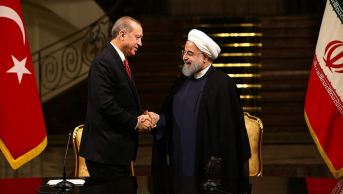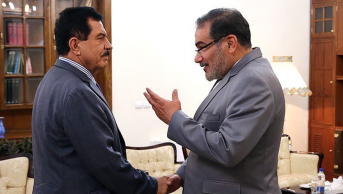Javad Zarif and Changing Foreign Policy of Iran
After the nuclear deal between Iran and P5+1 on July 14, there appeared headlined in the Iranian mediathat resembled Dr. Mohammad Javad Zarif, the Foreign Minister of Iran, to Dr. Mohammad Mosaddeq who has been a national heroin Iran. Dr. Mosaddeq had succeeded nationalizing oil in 1951 by struggling against the major powers of the time. Now, the Iranian delegation led by Zarif succeeded to have Iranian nuclear rights recognized by struggling against the major powers of today.
The successful conclusion of the deal on nuclear issue has increased popularity of Zarif among Iranian people, and some people tended to regard him as future president of Iran. However, Javad Zarif, who has a rare interest in domestic politics, defines himself as a ‘diplomat’ rather than a ‘politician.’
Zarif, the Ministerof Foreign Affairs
When President Hassan Rouhaniannounced Dr. Javad Zarif as foreign minister in his cabinet after June 2013 elections, the Western pundits welcomed this choice. Zarif had lived in the United States more than 20 years,initially as a student and then as a diplomat, where he had established good ties with some diplomats, media and research institutions.
Zarif was born as the fourth child of a religious, merchant family in Tehran in 1960. He went to San Francisco to pursue his university education. Then, he met with revolutionary groups amassed around Muslim Students Association, founded by Mostafa Chamran. Unlike many of his friends who returned Tehran after the revolution in 1979, he continued his studies in the United States. He studied on sanctions and international relations for his master’s degree, and wrote his PhD dissertation on self-defense in international law and policy at University of Denver.
He began his diplomatic career as an advisor to Iranian ambassador at thepermanent representation of Iran to the United Nations, in New York in 1982. He worked as deputy foreign minister in charge of law and international relations between 1992 and 2002. Zarif represented Iran in the United Nations as ambassador from 2002 until 2007. He represented Iran in the Bonn Conference of 2001 that addressed the rebuilding of Afghanistan. Zarif was a member of the Iranian team headed by Hassan Rouhani that negotiated nuclear issue with EU-3 between 2003 and 2005.
His life in the United States for more than 20 years and his good relations with Western diplomatic circles drew reaction of neo-radicals in Tehran. The then-president of Iran, Ahmadinejad, recalled Zarif to Tehran in 2007 as ‘ministerial advisor.’ Then he taught diplomacy and international organizations at the School of International Relations affiliated to Iranian Foreign Ministry, and at some other universities. He published many articles about disarmament, human rights, international law and regional conflicts. His memoirs are published as a booktitled ‘Mr. Ambassador’ in Tehran in 2013. According to his account in his memoirs, despite his long time in the United States, he had not been impressed from the American society and culture; he had never visited homes of non-Muslim Americans, and had noteven bother to learn pronunciations of words for spices in English...
Although theyears that Zarif had spent in the United States came to the fore at the parliamentary hearings as a negative factor for his appointment, he was eventually approved as the Minister of Foreign Affairs. Adopting the principle of ‘constructive interaction’ Zarif maintained his good ties with the Western media. Immediately after assuming the office, he started to send his messages to ‘international society’ via his ‘tweets’in English. The first sign of the changing discourse that had dominated Iranian foreign policy was Zarif’s tweet to congratulate the Jewish New Year, ‘Rosh Hashanah.’ He published an article titled ‘What Iran Really Wants’ in the journal of Foreign Affairs, where he outlined basics of Iranian foreign policy under Rouhani’s presidency. He gave numerous interviews and wrote many op-eds to the Western media.
The Iranian Foreign Ministry under Zarif took over the nuclear file in a short span of time. Soon after that, Iran and the United States initiated secret negotiations mediated by Sultan Qaboos of Oman. The parties publicly met at New York, at the sidelines of the UN General Assembly meetings in September 2013. They eventually reached an agreement for the solution of the nuclear controversy on July 2, 2015, after almost twenty-month-long negotiations.
New Foreign Policy of Iran
According to Zarif, the nuclear agreement will not lead rapid and dramatic changes in the relations between Iran and the West, particularly the United States. First, the negotiations exclusively covered issues related to the nuclear program, but did not handle bilateral relations or regional developments. Second, Iran and the United States have completely different worldviews due to some of the values that are part of their national identity. But those differences may not inherently lead a direct confrontation between the two parties. Third, Zarif claims, the paradigm that rule over American foreign policy should be changed. Due to this paradigm that continuously built enemies, American governments portrayed Iran as if it is a threat to international security, and tried to isolate it.
Zarif states that thecontroversy around Iranian nuclear program isentirelyan artificialand secondary issue in contemporary international affairs. The first priority of international community and regional states should be the struggle against terrorism, violent extremism, and sectarianism. Those threats that already gripped Iraq and Syria and do not recognize borders, affect whole region where they threaten historical social structure and cultural heritage. This is one of the most important issues that Iran, regional countries and the West should cooperate.
Advocating a comprehensive strategy to fight violent extremism, Zarif puts forward some ideas on this issue. According to him, such a strategy should include all regional states and international actors, should be consistent and coherent to avoid double standards, and should be in conformity with principles and norms of international law. In this regard he reminds President Rouhani’s call for ‘a world without violent extremism’ at the UN General Assembly, and states that Iranians from all ages and all groups are resolved to fight against extremism.
According to Zarif, the nuclear issue that is also regarded as an important matter in Iran’s relations with regional countries is not a reason, but a symptom of distrust and turmoil in the region. The nuclear agreement between Iran and P5+1 proves that Iranian program is peaceful, and it contributes to the removal of that symptom. Thus, he suggests, Iran and regional countries could come together at a common platform in order to address regional developments and reasons of the turmoil. He puts forward ‘the establishment of a collective forum for dialogue in the Persian Gulf region to facilitate engagement.’ This regional dialogue should be based on the principles such as respect for sovereignty and territorial integrity, non-interference in internal affairs, peaceful settlement of disputes,and impermissibility of use of force. In addition to bringing regional governments together, this forum should include private sector and non-governmental organizations.
Iran and the Middle East
Having consolidated his belief in the principle of ‘constructive interaction’through the nuclear deal, Zarif is engaged in pioneering the same principle for the solution of regional issues. This engagement will provide Iran an active role in the future of Middle East as far as it will help building peace and stability in the region. However, some of the regional countries, which are discomforted with the rising power of Iran,mainly Saudi Arabia taking the lead, will not allow Iran to play such a role. Indeed, the ongoing polarization across the region and the fact that Iran is heavily involved in many regional conflicts, decrease the credibility of Zarif’s ‘constructive’ discourse. For this reason, it is very difficult for Zarif to repeat his diplomatic successthat he achieved at the nuclear talks, in regional affairs.
First, as Zarif stated, the nuclear controversy is not a primary issue in Iran’s relations with the regional countries. Therefore, solution of the nuclear issue, or reconciliation between Iran and the West, will not directly lead a change in relations between Iran and the regional countries. Although the Middle East could be regarded in a transition process, there is no geopolitical earthquake to force regional countries to a dramatic change in their foreign policies. Iran views the issue of violent extremism as a break point that will enable to reshuffle cards in regional politics. However, most of the regional countries do not trust Iran and they are not ready to cooperate with it on this issue in such a period that there is heavy regional polarization. Then, the only factor that will supposedly transform regional politics becomes the new foreign policy of Iran.Under these circumstances, Iran has todemonstrate the change in its foreign policy not only by its discourse but also by some concrete actions. Additionally, because the solution of regional conflicts necessitates a synchronized and shared will among all parties, change in Iran’s regional policy will not be sufficient, and positions and policies of other regional actors will be decisive.











